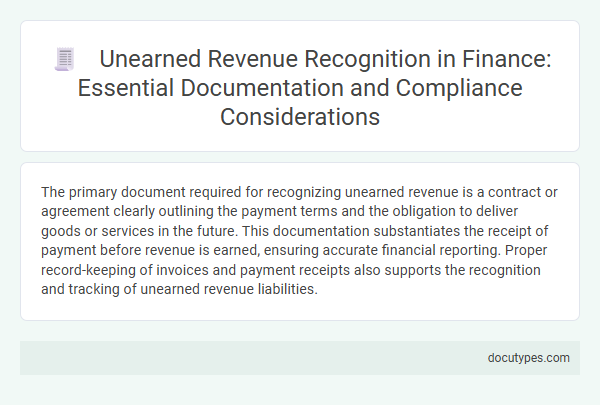The primary document required for recognizing unearned revenue is a contract or agreement clearly outlining the payment terms and the obligation to deliver goods or services in the future. This documentation substantiates the receipt of payment before revenue is earned, ensuring accurate financial reporting. Proper record-keeping of invoices and payment receipts also supports the recognition and tracking of unearned revenue liabilities.
Understanding Unearned Revenue in Finance
Unearned revenue represents payments received by a business before delivering goods or providing services. It is recorded as a liability on the balance sheet until the revenue is earned.
The primary document required for recognizing unearned revenue is a contract or agreement with the customer. This document outlines the payment terms and the obligations to be fulfilled, ensuring proper revenue recognition in compliance with accounting standards.
Key Principles of Revenue Recognition
Unearned revenue is recorded when your business receives payment before delivering goods or services. The document required to recognize unearned revenue is typically a signed contract or agreement outlining the terms of the transaction and payment details.
Key principles of revenue recognition emphasize the transfer of control and satisfaction of performance obligations. The signed contract serves as evidence of the obligation and payment received, ensuring compliance with accounting standards like ASC 606. Accurate documentation supports proper financial reporting and audit trails for unearned revenue.
Essential Documentation for Unearned Revenue
Recognizing unearned revenue requires specific documentation to ensure accurate financial reporting. Proper documentation helps verify the timing and amount of revenue recognition according to accounting standards.
- Sales Agreement - A contract outlining the terms and conditions between the seller and the customer, specifying payment and delivery details.
- Payment Receipt - Evidence of cash or payment received in advance, confirming the liability for unearned revenue.
- Service or Delivery Schedule - A documented timeline indicating when services or goods will be delivered, supporting revenue recognition over time.
Common Examples of Unearned Revenue Transactions
What document is required for recognizing unearned revenue? A sales agreement or contract is essential for documenting the terms of payment and delivery of goods or services. Common examples of unearned revenue transactions include advance payments for subscriptions, deposit received for future service, and prepayments for event tickets.
Compliance Requirements for Unearned Revenue Reporting
Proper documentation for recognizing unearned revenue is essential to ensure compliance with accounting standards and regulatory requirements. Accurate records support transparency and prevent financial misstatements.
- Contract Agreement - A signed contract clarifies the terms of the advance payment and the obligations for delivery of goods or services.
- Invoice or Receipt - Documentation of the payment received substantiates the amount recorded as unearned revenue.
- Revenue Recognition Policy - Your company's written policy ensures consistent application of accounting principles for unearned revenue reporting.
Best Practices for Financial Documentation
Recognizing unearned revenue requires a clear and accurate financial document, typically a signed contract or agreement outlining the terms of payment and delivery. This document serves as proof of the obligation to provide goods or services in the future, ensuring compliance with accounting standards.
Best practices for financial documentation include maintaining detailed records of client agreements and payment receipts to support revenue recognition. Your financial team should regularly review and update these documents to ensure transparency and accuracy in financial reporting.
Internal Controls for Revenue Recognition
Recognizing unearned revenue requires a clear and accurate document, typically a customer contract or a signed agreement, detailing the payment terms and delivery obligations. Internal controls for revenue recognition emphasize verifying these documents to ensure revenue is recorded only when earned, preventing premature or inflated revenue reporting. Your finance team must maintain strict oversight of these records to uphold compliance with accounting standards and safeguard financial integrity.
Challenges in Unearned Revenue Compliance
| Document Required for Recognizing Unearned Revenue | Purpose | Common Challenges in Unearned Revenue Compliance |
|---|---|---|
| Customer Contract or Agreement | Establishes the terms and conditions of the service or product delivery, defining payment timing and performance obligations for accurate revenue recognition. | Inconsistent contract terms and ambiguous performance obligations complicate the identification of unearned revenue and its timing. |
| Invoice or Payment Receipt | Confirms receipt of payment that may need to be recorded as unearned revenue if services/products are pending delivery. | Timing mismatches between invoicing and service delivery often lead to improper recording of revenue prematurely. |
| Revenue Recognition Schedule | Outlines the timeline over which revenue will be earned and recognized according to accounting standards (e.g., ASC 606 or IFRS 15). | Complex revenue schedules for multi-element contracts can cause difficulties in allocating revenue correctly over periods. |
| Delivery Confirmation or Acceptance Document | Proof that goods or services have been delivered or accepted, triggering revenue to be recognized from unearned to earned. | Delays in obtaining delivery confirmation and unclear acceptance criteria delay accurate revenue recognition. |
| Internal Accounting Records | Tracks unearned revenue balances and adjustments for audit trails and compliance with financial reporting frameworks. | Manual record-keeping and lack of integration with contract management systems increase risk of errors and non-compliance. |
Impact of Accounting Standards on Documentation
Accounting standards dictate the specific documentation necessary for recognizing unearned revenue to maintain accurate financial reporting. Proper documentation ensures compliance and reflects the financial position accurately in your records.
- Invoice or Contract - Serves as proof of the transaction and terms under which payment is received before delivery of goods or services.
- Payment Receipt - Confirms receipt of funds and justifies the recognition of a liability until the revenue is earned.
- Accounting Policies - Provide guidelines aligned with standards such as IFRS 15 or ASC 606 for recognizing and documenting unearned revenue correctly.
Strict adherence to these documentation requirements ensures transparent and compliant financial statements.
What Document Is Required for Recognizing Unearned Revenue? Infographic

